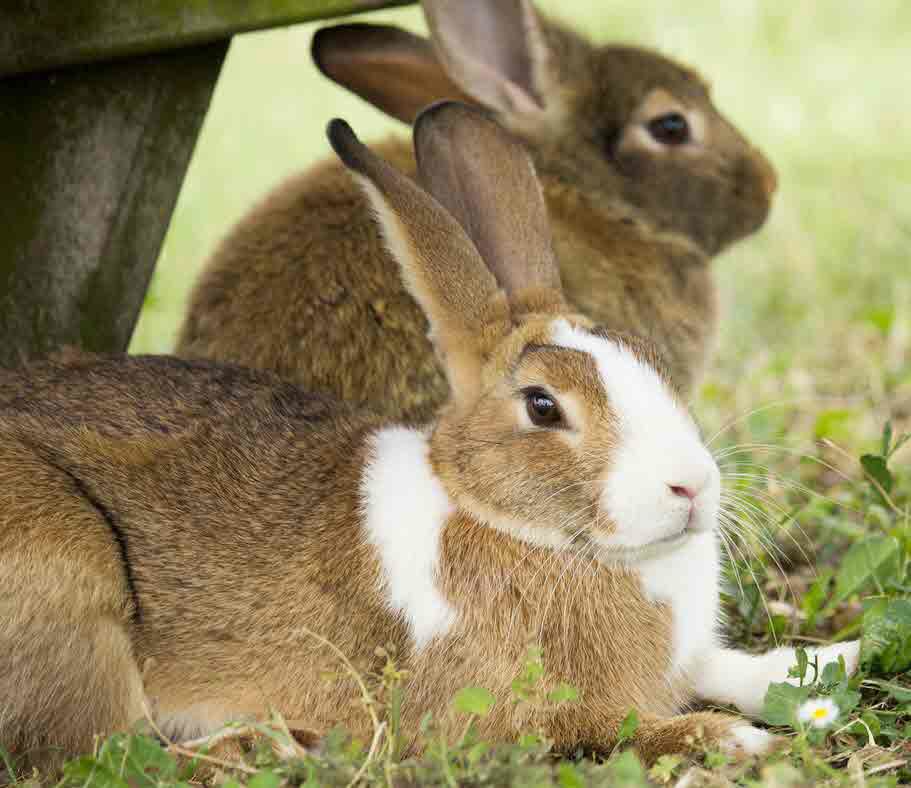The importance of the right diet and dental care for rabbits

Feeding your pet rabbit a nutritionally-balanced diet is one of the most important ways to maintain their general health and wellbeing. A poor-quality diet can contribute to multiple health issues in rabbits.
What makes an unsuitable rabbit diet?
In the wild, rabbits eat high-fibre foods such as grass, plants, bark, dried leaves, and occasional wild fruits. As a result, they have evolved to have a long gut with a caecum – a specialised fermentation chamber that breaks down plant fibres. They also have teeth which grow constantly – up to 2mm per week! – in order to cope with the need for frequent chewing.
Traditionally, many rabbits have been given little access to fresh grass (or good-quality hay), and instead were maintained largely on muesli-based mixes. These muesli diets contain insufficient fibre, calcium and Vitamin D, and are too high in carbohydrates. They also allow “selective feeding”, where the rabbit is able to pick out only the food they want to eat (usually the sweet stuff!).
What issues does poor diet cause?
Diets that are low in fibre, high in carbohydrates, or have an incorrect balance of calcium and phosphorous can cause a number of health issues for your rabbit:
Dental disease: Low fibre diets don’t provide rabbits with much chewing activity, so their constantly growing teeth can overgrow. This leads to painful dental disease (including abscesses) and secondary eye problems. Calcium/phosphorous imbalance may also contribute to dental disease through unhealthy jaw and tooth development.
Poor gut health: Low fibre, high carbohydrate diets can cause diarrhoea and gut problems (especially in young rabbits).
Obesity: High carbohydrate diets allow your rabbit to overeat beyond their energy requirements. An overweight rabbit is more prone to skin issues due to difficulty grooming and excess skin folds, and is more likely to be affected by arthritis.
Urinary disease: Diets with excess calcium can cause kidney or bladder stones, resulting in pain, infections, and kidney damage.
Behavioural issues: Rabbits on low fibre, high carbohydrate diets are more likely to develop problem behaviours, such as overgrooming or aggression. This is because “quick energy” foods make for a short meal, leaving them bored and frustrated.
What diet should I feed my pet rabbit?
Every pet rabbit should have free access to fresh grass (though grazing, or offered freshly cut) or good quality grass hay – this should make up about 70-80% of their diet. In addition to this, your rabbit should have a strictly-measured portion of good quality pellet or extruded food, which will help meet their vitamin and mineral balance requirements. The remaining portion of your rabbit’s food should consist of a variety of fresh greens, such as broccoli, cabbage, radicchio, brussels sprouts, spinach, kale, bok choy, celery and various herbs. Only feed small portions of fruit (e.g. bananas, pears, etc.) or succulent items (e.g. lettuce, cucumber) as a special treat.
Feeding your rabbit the correct diet is the first step towards good health. Ask your vet for more information on quality-balanced food products for your bunny buddy.
